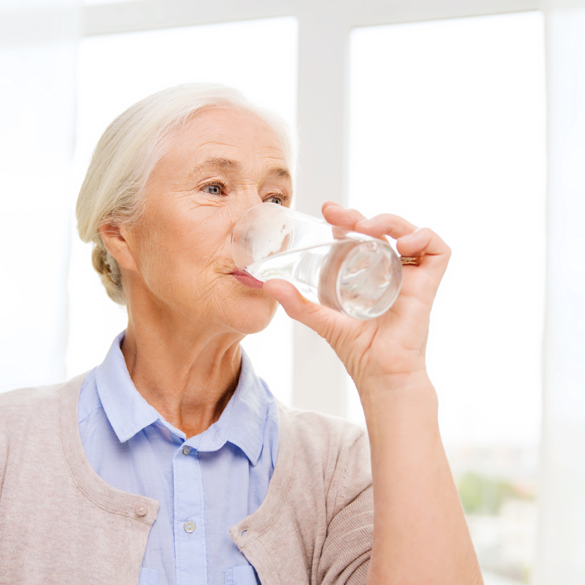Dehydration and Seniors
Senior Health and Wellbeing | April 30, 2021

What Every Senior in Victoria, BC, Needs to Know About Senior Dehydration
Dehydration and Seniors | Seniors are at a higher risk of dehydration than any other age group. With age, physiological changes happen in the body that increase the risk of becoming dehydrated. For example, many seniors lose their sense of thirst, which is why they do not drink enough fluids. Also, as older adults engage in fewer physical activities and tend to eat fewer calories, they do not get fluids from solid foods, like fruits or veggies.
Seniors can also develop dehydration as a result of medications, stress, health problems, and the weather. Because older adults are unable to regulate body temperatures as well as younger adults, they are more affected by changes in temperatures. Plus, seniors perspire less, which makes it difficult for them to stay cool while also making them more susceptible to dehydration. This is also why older adults are more prone to heat exhaustion and heat stroke, two very serious conditions that are closely related to dehydration.
The Signs and Symptoms of Dehydration and Seniors
Since dehydration can in severe cases lead to death, it is important to know the most common signs and symptoms. Dehydration is often manifested with fatigue, lethargy, forgetfulness, muscle weakness, headaches, dizziness, confusion, rapid breathing, and an increased heart rate. But there are also some less common symptoms to be on the lookout for, such as loss of fluids through vomiting, sunken eyes, dry/sticky mucous membranes in the mouth, decreased tears, and decreased urine output.
If your loved one has any of these symptoms and if taking in fluids does not help, go to the emergency room or contact your doctor immediately.
How to Prevent Dehydration in Seniors
To prevent dehydration in seniors, it is important to monitor their fluid intake and ensure they are taking at least 64 ounces of fluids on a daily basis. Older adults should take in fluids through water and non-caffeinated drinks (caffeinated drinks and alcohol can lead to dehydration), as well as through fruits and veggies like melons, berries, apples, peaches, cucumbers, and cauliflower. If your loved one is unable to take in plenty of fluids due to the taste of water, you can mix water with powdered drink mixes (but do not add any sugar).
Following these simple tips should prevent dehydration in seniors. But be especially careful during warm months and make sure your loved one always has a bottle of water nearby.
The Best Senior Home Care Provider in Victoria, BC, is Comfort Keepers®
Firstly, if you are concerned about the health and well-being of your aging loved ones, we can help with 24-hour care. We offer senior care, post-surgery care, palliative care, personal care, senior living transition services, and much more!
Comfort Keepers® Victoria Provides In-Home Elderly Care Services
Aging in place means keeping seniors happy and healthy at home. Comfort Keepers® trained caregivers provide seniors with the highest quality of life possible. In particular, our Interactive Caregiving™ system provides care that addresses safety, nutrition, mind, body, and activities of daily living.
Comfort Keepers® Victoria In-Home Caregivers Can Help with Interactive Caregiving™
Personal and empathetic care starts in the heart and allows us to meet our clients’ needs. Our philosophy is to elevate the human spirit. Our caregivers will be there every step of the way to ensure your loved one has a better quality of life.
Senior Homecare in Victoria, BC
Our unique services offer families respite care, overnight care, personal care, companionship care, palliative care, and end-of-life care. To learn more, contact the Comfort Keepers Victoria office.
Comfort Keepers® Victoria is Proud to Provide Senior Care and Home Care Services to Keep Seniors Safe in Their Homes
If you are searching for home care near you, we can help! Comfort Keepers® Victoria can provide home care for Victoria and surrounding areas. Service territory includes Colwood, Saanich, Sidney, James Bay, and Oak Bay. Please call (778) 265-5999 and learn how your loved ones can receive compassionate, professional in-home care.
Quality and Accredited Respite Care for British Columbia Families
Comfort Keepers® Victoria has achieved Exemplary Standing accreditation from Accreditation Canada. This accreditation, a rigorous evaluation of organizational processes, policies, and procedures against established quality standards by industry experts, signifies that Comfort Keepers’ offices have successfully met or surpassed the stringent benchmarks for Home Care companies as defined by Accreditation Canada.
Individualized Home Care Options
Long-Term Home Care, 24 Hour Home Care & Short Term Care Options Customized for You






